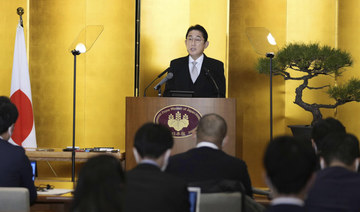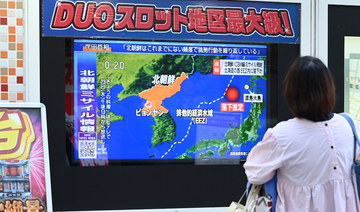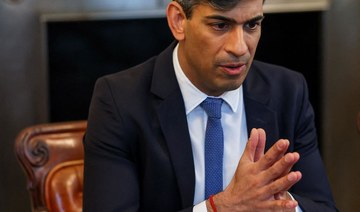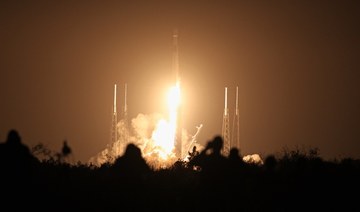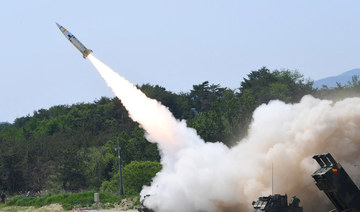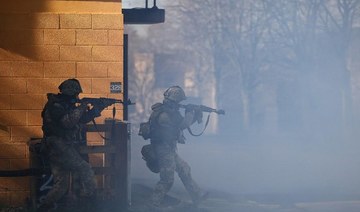WASHINGTON: The top national security officials from the US and Japan unveiled plans Wednesday to strengthen the alliance to help counter threats from North Korea and China, which they called the greatest challenge in the region.
Secretary of State Antony Blinken said the agreement reflects the two nations’ effort to deepen cooperation “across all realms,” including space, cybersecurity and emerging technologies.
“It is hard to overstate the importance of the US-Japan alliance for more than seven decades,” said Blinken, following the meeting at the State Department. “It’s been the cornerstone of peace and stability in the Indo-Pacific, ensuring the security, the liberty and prosperity of our people and people across the region.”
The two nations are revising their joint defense posture and planning increased military exercises as they confront rising threats from North Korea and increasing aggressiveness from China.
The US and Japanese foreign and defense ministers agreed to adjust the American troop presence on the island of Okinawa. Prior to the meeting, Japan’s defense ministry announced it was ready to start construction on an uninhabited island where the two militaries will hold joint military exercises.
Wednesday’s discussions will be followed by a meeting on Friday between President Joe Biden and Japanese Prime Minister Fumio Kishida at which they will underscore the importance of the relationship.
Kishida, on a weeklong trip to visit allies in Europe and North America, signed a defense agreement with British Prime Minister Rishi Sunak on Wednesday that strengthens military ties between their two counties, also in response to China’s increasing military assertiveness.
Following their talks, Blinken, Defense Secretary Lloyd Austin and their Japanese counterparts, Yoshimasa Hayashi and Yasukazu Hamada, planned to issue a joint statement that will adjust, but not increase, the American troop presence on Okinawa.
Speaking to reporters after the meeting, all four condemned China’s increasing aggression in the region and said the agreement will provide a strong path to counter that.
Austin noted that the agreement affirms America’s “ironclad commitment to defend Japan with a full range of capabilities, including nuclear” and underscores that Article 5 of the mutual security treaty applies to the Senkaku Islands. The disputed islands outside Japanese territorial waters are also claimed by Beijing.
The statement also adds a formal mention of space in the longstanding security treaty, making clear that “attacks to, from and within space” could trigger the mutual defense provisions of the treaty, according to an administration fact sheet. That had previously been outside the scope of the agreement.
Earlier Wednesday, Japan said it would soon begin constructing a pair of runways on the small southern island of Mageshima where the two militaries are to conduct joint exercises, including those of F-35B stealth fighters, amphibious operations and missile interception beginning around 2027.
The construction could start as early as Thursday, it said. The island, off the southwestern coast of Kagoshima on the southernmost main island of Kyushu, will be a hub for troop deployment and munition supply in case of a conflict like a Taiwan emergency.
Japan and the United States are moving one of their key flight exercise sites to the southern island, which is much closer to the US air base of Iwakuni, home to an F-35B fleet, than the current training site on Iwo Jima, where one of the bloodiest and most iconic battles of World War II was fought.
The changes in the deployment on Okinawa will transform the 12th Marine Regiment into a smaller, more rapidly mobile unit — the 12th Marine Littoral Regiment, which will be designed to be better equipped to fight an adversary and defend the US and its allies in the region, US officials said.
Austin said the regiment will bring “tremendous” capabilities to the region as a “more lethal, more agile, more capable” military unit.
The officials said the decision will not increase the number of Marines on the island and does not come with any significant change in weapons capability.
Reinforcement of military capability or troops is a sensitive issue for Okinawa, site of one of the bloodiest ground battles at the end of World War II. The island hosts more than half of the US troops based in Japan, and Okinawans want that number reduced.
A senior administration official, who requested anonymity to discuss negotiations with the Japanese, said historically negotiations involving US force posture in Okinawa have been “unbelievably fraught, incredibly challenging and difficult” and often took years to complete. But negotiations before Wednesday’s meeting were completed with striking speed, the official said.
The agreements follow Japan’s announcement last year that it would increase its defense spending to 2 percent of gross domestic product over five years. That would make its defense budget the world’s third-largest — a dramatic shift in Tokyo’s priorities that reflects growing concerns about North Korea and potential Chinese military action against Taiwan.
While there is a growing fear of a Taiwan emergency, many islands in the region are concerned that a defense buildup could increase the risks of getting embroiled in war.
The change in Okinawa is part of a broader shift being made across the Marine Corps to make the service better able to operate in contested areas, particularly within striking range of an enemy. That element is critical in the Indo-Pacific, where thousands of US and allied forces are easily within missile — or even rocket — range of both China and North Korea.
One Marine littoral regiment has already been set up in Hawaii, the second would be in Okinawa..
Details are still being worked out, but a littoral regiment is made up of roughly 2,000 Marines, and includes a combat team with an anti-ship missile battery, a logistics battalion and an air defense battalion. The current Marine regiment on Okinawa that it would essentially replace includes about 3,400 Marines and sailors. The overall number of Marines on Okinawa would remain about the same, officials said.
In their talks on Friday, Biden is expected to raise with Kishida the case of Lt. Ridge Alkonis, a US Navy officer deployed to Japan who has been jailed after pleading guilty last year to the negligent driving deaths of two Japanese citizens in May 2021, according to the senior administration official.
Alkonis’ family says he suddenly fell unconscious behind the wheel during a family trip on Mt. Fuji. He was so out of it, they say, that neither his daughter’s screams to wake up nor the impact of the collision roused him.
Alkonis’ car veered into parked cars and pedestrians in a parking lot, striking an elderly woman and her son-in-law, both of whom later died. Alkonis was sentenced to three years in prison in October, a sentence that the family and US lawmakers have called unduly harsh considering the circumstances. Alkonis also agreed to pay the victims’ $1.65 million in restitution.
The official said the administration was working “to find a compassionate resolution that’s consistent with the rule of law.”
US, Japan unveil plans to strengthen the alliance
https://arab.news/bzuaj
US, Japan unveil plans to strengthen the alliance
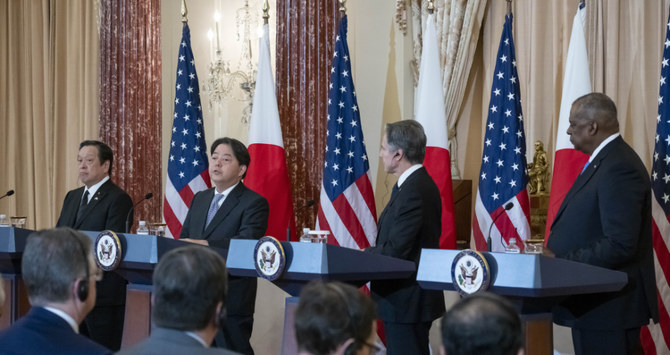
Blinken calls for US, China to manage differences
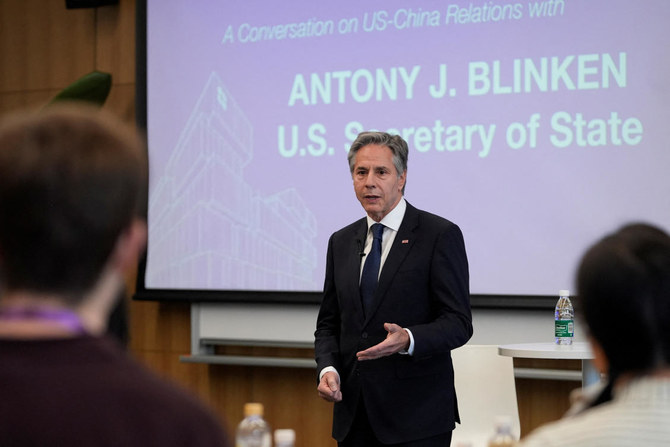
- China has not announced plans for US Secretary of State to meet Xi Jinping
- Antony Blinken is the first US secretary of state in 14 years to visit Shanghai
A day before meeting Beijing’s top brass to tackle thorny issues including Russia, Taiwan and trade, Blinken’s visit to Shanghai has seen him sample local food, watch a basketball game and stroll along the city’s famous Bund promenade.
Visiting the local Communist Party leader in a room with sweeping views of the Shanghai skyline, Blinken said US President Joe Biden was committed to “direct and sustained” dialogue between the world’s two largest economies after years of mounting tension.
“I think it’s important to underscore the value — in fact, the necessity — of direct engagement, of speaking to each other, laying out our differences, which are real, seeking to work through them,” Blinken said.
“We have an obligation for our people — indeed an obligation to the world — to manage the relationship between our two countries responsibly.”
The Chinese Communist Party secretary for Shanghai, Chen Jining, welcomed Blinken partly in English and spoke of the importance of US businesses to the city.
“Whether we choose cooperation or confrontation affects the well-being of both peoples, both countries and the future of humanity,” Chen told him.
The country’s financial capital, Shanghai is often a stepping stone to power in China, with President Xi Jinping previously serving briefly in the city.
China has not announced plans for Blinken to meet Xi, although on Blinken’s last visit in June, they saw each other in a meeting announced at the last minute.
On Thursday, Blinken also met students at the Shanghai campus of New York University, where he voiced hope for more Americans to study in China.
He insisted the United States was committed to welcoming Chinese students.
Beijing has repeatedly alleged that Chinese nationals with valid travel documents, including students, have been subject to aggressive interrogations and deportations at US airports.
“President Biden and President Xi are determined to strengthen our people-to-people ties,” Blinken said.
Blinken, the first US secretary of state in 14 years to visit Shanghai, opened his visit Wednesday evening at a restaurant serving steamed buns.
Sporting a suit without a tie, he ate with his senior staff in a shopping arcade as curious onlookers snapped pictures.
Blinken then went to watch a basketball game between the Shanghai Sharks and Zhejiang Golden Bulls, staying until the end of the nail-biting play-off.
Such softer diplomacy, once a staple of US-China relations, would have been unimaginable until recently, with hawks in both countries speaking of an emerging new Cold War.
Blinken’s aides hope his smiling persona at public events draws an implicit contrast to his Russian counterpart Sergei Lavrov and his gruffer approach when he visited China earlier this month.
Blinken is expected to raise concerns about China’s relationship with Russia when he meets the leadership in Beijing.
Although US officials were initially pleased that Beijing has not shipped weapons to Russia for its war in Ukraine, they now say that China’s alarm at Moscow’s setbacks on the battlefield has prompted it to export vast quantities of industrial supplies to Russia.
US officials believe China is more receptive to Western concerns as it seeks to focus on managing economic headwinds at home and wants to avoid friction with the West.
But China is also furious about a series of moves by Biden — who is facing a tough re-election fight in November against Donald Trump — they say serve to constrain the Chinese economy.
Most recently, the US Congress approved legislation that would force the divestment of blockbuster social media app TikTok from its Chinese owners or face a ban in the world’s largest economy.
Biden supports the legislation, arguing that TikTok, popular among young people, poses security and privacy concerns. China has accused the United States of unfair economic coercion.
Unusually, Trump has distanced himself from a TikTok ban. He has otherwise championed a tough line on China, with vows to raise tariffs drastically if he returns to office.
US officials also say that Blinken will encourage China to act with restraint as Taiwan inaugurates a new president next month.
China claims the self-governing democracy as its own and has not ruled out using force to seize it.
Privately, US officials were relieved by China’s approach during Taiwan’s election, believing that easing US-China tensions helped.
They assessed that Beijing’s assertive military moves did not go beyond past precedent.
Rwanda’s Hope Hostel once housed young genocide survivors. Now it’s ready for migrants from Britain
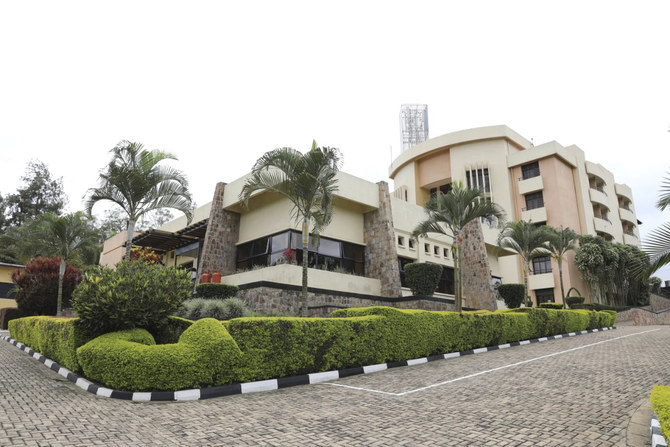
KIGALI, Rwanda: Rwanda says it’s ready to receive migrants from the United Kingdom after British Parliament this week approved a long-stalled and controversial bill seeking to stem the tide of people crossing the English Channel in small boats by deporting some of them to the East African country.
There is even a place ready and waiting for the migrants — a refurbished Hope Hostel in the vibrant upscale neighborhood of Kagugu, an area of the Rwandan capital of Kigali that is home to many expats and several international schools.
The hostel once housed college students whose parents died in the 1994 genocide, this African nation’s most horrific period in history when an estimated 800,000 Tutsi were killed by extremist Hutu in massacres that lasted over 100 days.
British Prime Minister Rishi Sunak has pledged the deportation flights would begin in July but has refused to provide details or say about how many people would be deported.
Rwanda government’s deputy spokesperson Alain Mukuralinda told The Associated Press on Tuesday that authorities here have been planning for the migrants’ arrival for two years.
“Even if they arrive now or tomorrow, all arrangements are in place,” he said.
The plan was long held up in British courts and by opposition from human rights activists who say it is illegal and inhumane. It envisages deporting to Rwanda some of those who enter the UK illegally and migrant advocates have vowed to continue to fight against the plan.
The measure is also meant to be a deterrent to migrants who risk their lives in leaky, inflatable boats in hopes that they will be able to claim asylum once they reach Britain. The UK also signed a new treaty with Rwanda to beef up protections for migrants, and adopted new legislation declaring Rwanda to be a safe country.
“The Rwanda critics and the UK judges who earlier said Rwanda is not a safe country have been proven wrong,” Mukuralinda said. “Rwanda is safe.”
The management at the four-story Hope Hostel says the facility is ready and can accommodate 100 people at full capacity. The government says it will serve as a transit center and that more accommodations would be made available as needed.
Thousands of migrants arrive in Britain every year.
After they arrive from Britain, the migrants will be shown to their rooms to rest, after which they will be offered food and given some orientation points about Kigali and Rwanda, said hostel manager Ismael Bakina.
Tents will be set up within the hostel’s compound for processing their documentation and for various briefings. The site is equipped with security cameras, visible across the compound.
Within the compound are also entertainment places, a mini-soccer field, a basketball and a volleyball court as well as a red-carpeted prayer room. For those who want to light up, “there is even a smoking room,” Bakina explained.
Meals will be prepared in the hostel’s main kitchen but provisions are also being made for those who want to prepare their own meals, he said. The migrants will be free to walk outside the hostel and even visit the nearby Kigali city center.
“We will have different translators, according to (their) languages,” Bakina added, saying they include English and Arabic.
The government has said the migrants will have their papers processed within the first three months. Those who want to remain in Rwanda will be allowed to do so while authorities will also assist those who wish to return to their home countries.
While in Rwanda, migrants who obtain legal status — presumably for Britain — will also be processed, authorities have said, though it’s unclear what that means exactly.
For those who choose to stay, Mukurilinda said Rwanda’s government will bear full financial and other responsibilities for five years, after which they will be considered integrated into the society.
At that point, they can start managing on their own.
Russia vetoes a UN resolution calling for the prevention of a dangerous nuclear arms race in space
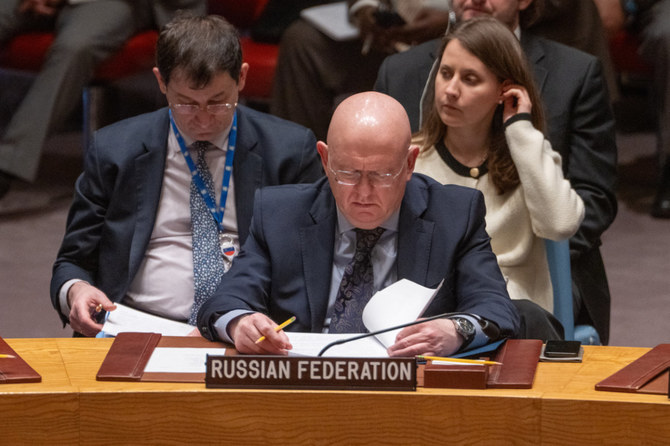
- The vetoed resolution sought to call on all countries not to develop or deploy nuclear arms or other weapons of mass destruction in space
- Russia dismissed the resolution as “absolutely absurd and politicized” and didn’t go far enough in banning all types of weapons in space
UNITED NATIONS: Russia on Wednesday vetoed a UN resolution sponsored by the United States and Japan calling on all nations to prevent a dangerous nuclear arms race in outer space, calling it “a dirty spectacle” that cherry picks weapons of mass destruction from all other weapons that should also be banned.
The vote in the 15-member Security Council was 13 in favor, Russia opposed and China abstaining.
The resolution would have called on all countries not to develop or deploy nuclear arms or other weapons of mass destruction in space, as banned under a 1967 international treaty that included the US and Russia, and to agree to the need to verify compliance.
US Ambassador Linda Thomas-Greenfield said after the vote that Russian President Vladimir Putin has said Moscow has no intention of deploying nuclear weapons in space.

“Today’s veto begs the question: Why? Why, if you are following the rules, would you not support a resolution that reaffirms them? What could you possibly be hiding,” she asked. “It’s baffling. And it’s a shame.”
Putin was responding to White House confirmation in February that Russia has obtained a “troubling” anti-satellite weapon capability, although such a weapon is not operational yet.
US National Security Advisor Jake Sullivan on Wednesday echoed Thomas-Greenfield, reiterating that “the United States assesses that Russia is developing a new satellite carrying a nuclear device.” If Putin has no intention of deploying nuclear weapons in space, Sullivan said, “Russia would not have vetoed this resolution.”
Russia’s UN Ambassador Vassily Nebenzia dismissed the resolution as “absolutely absurd and politicized,” and said it didn’t go far enough in banning all types of weapons in space.
Russia and China proposed an amendment to the US-Japan draft that would call on all countries, especially those with major space capabilities, “to prevent for all time the placement of weapons in outer space, and the threat of use of force in outer spaces.”
The vote was 7 countries in favor, 7 against, and one abstention and the amendment was defeated because it failed to get the minimum 9 “yes” votes required for adoption.
The US opposed the amendment, and after the vote Nebenzia addressed the US ambassador saying: “We want a ban on the placement of weapons of any kind in outer space, not just WMDs (weapons of mass destruction). But you don’t want that. And let me ask you that very same question. Why?”
He said much of the US and Japan’s actions become clear “if we recall that the US and their allies announced some time ago plans to place weapons … in outer space.”
Nebenzia accused the US of blocking a Russian-Chinese proposal since 2008 for a treaty against putting weapons in outer space.
Thomas-Greenfield accused Russia of undermining global treaties to prevent the spread of nuclear weapons, irresponsibly invoking “dangerous nuclear rhetoric,” walking away from several of its arms control obligations, and refusing to engage “in substantive discussions around arms control or risk reduction.”
She called Wednesday’s vote “a real missed opportunity to rebuild much-needed trust in existing arms control obligations.”
Thomas-Greenfield’s announcement of the resolution on March 18 followed White House confirmation in February that Russia has obtained a “troubling” anti-satellite weapon capability, although such a weapon is not operational yet.
Putin declared later that Moscow has no intention of deploying nuclear weapons in space, claiming that the country has only developed space capabilities similar to those of the US.
Thomas-Greenfield said before the vote that the world is just beginning to understand “the catastrophic ramifications of a nuclear explosion in space.”
It could destroy “thousands of satellites operated by countries and companies around the world — and wipe out the vital communications, scientific, meteorological, agricultural, commercial, and national security services we all depend on,” she said.
The defeated draft resolution said “the prevention of an arms race in outer space would avert a grave danger for international peace and security.” It would have urged all countries carrying out activities in exploring and using outer space to comply with international law and the UN Charter.
The draft would have affirmed that countries that ratified the 1967 Outer Space Treaty must comply with their obligations not to put in orbit around the Earth “any objects” with weapons of mass destruction, or install them “on celestial bodies, or station such weapons in outer space.”
The treaty, ratified by some 114 countries, including the US and Russia, prohibits the deployment of “nuclear weapons or any other kinds of weapons of mass destruction” in orbit or the stationing of “weapons in outer space in any other manner.”
The draft resolution emphasized “the necessity of further measures, including political commitments and legally binding instruments, with appropriate and effective provisions for verification, to prevent an arms race in outer space in all its aspects.”
It reiterated that the UN Conference on Disarmament, based in Geneva, has the primary responsibility to negotiate agreements on preventing an arms race in outer space.
The 65-nation body has achieved few results and has largely devolved into a venue for countries to voice criticism of others’ weapons programs or defend their own. The draft resolution would have urged the conference “to adopt and implement a balanced and comprehensive program of work.”
At the March council meeting where the US-Japan initiative was launched, UN Secretary-General António Guterres warned that “geopolitical tensions and mistrust have escalated the risk of nuclear warfare to its highest point in decades.”
He said the movie “Oppenheimer” about Robert Oppenheimer, who directed the US project during World War II that developed the atomic bomb, “brought the harsh reality of nuclear doomsday to vivid life for millions around the world.”
“Humanity cannot survive a sequel to Oppenheimer,” the UN chief said.
Long-awaited US military aid no ‘silver bullet’ for Ukraine
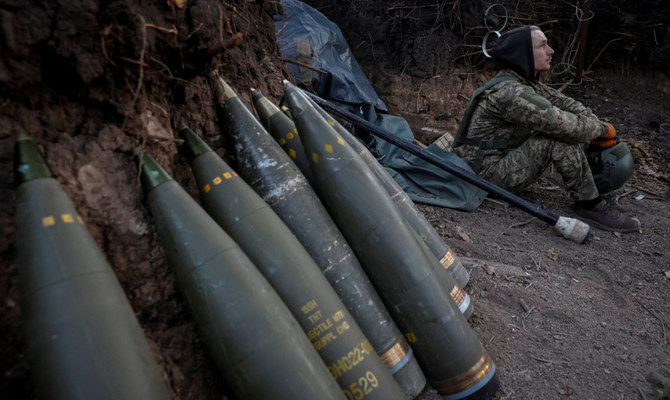
- Kyiv has been heavily reliant on billions of dollars of US military aid in its war with Russia following Moscow’s full-scale invasion in February 2022
WASHINGTON, United States: The United States is the first to acknowledge that its long-awaited $61 billion aid package for Ukraine is not a "silver bullet."
As weapons and ammunition are rushed to the country, other issues such as manpower shortages in Kyiv's struggling military have come to the fore.
Meanwhile, the monthslong delay in passing the aid package — caused by wrangling among US lawmakers — has further weakened Ukraine's position on the battleground, according to analysts.
President Joe Biden, who quickly signed the law Wednesday after it passed Congress, said the bill "should have gotten there sooner."
Jake Sullivan, his National Security Advisor, said the aid package "will make a difference," but warned "there is no silver bullet in this conflict."
"One capability is not going to be the ultimate solution," Sullivan told a White House briefing, though he added "Ukraine's position in this conflict will improve and we believe that Ukraine can and will win."
Kyiv has been heavily reliant on billions of dollars of US military aid in its war with Russia following Moscow's full-scale invasion in February 2022.
But in recent months Ukrainian forces — outgunned and outmanned — have struggled to hold back Russian troops.
And in the United States — Ukraine's largest provider of military assistance — a bogged-down Congress had not approved large-scale funding for Kyiv since December 2022 before the new package was passed this week.
It contains nearly $14 billion to train, equip and finance the needs of the Ukrainian army.
Manpower shortage
Garret Martin, of the American University School of International Service in Washington, said the delay by US lawmakers in passing the aid package "had a cost."
"The aid can shore up Ukraine but it's not a magic wand that could fix all the challenges they face," Martin said.
"What the package cannot do is deal with the shortage of manpower," he added.
Biden and his Ukrainian counterpart Volodymyr Zelensky have discussed the manpower issue, according to the White House.
In April, Kyiv reduced the minimum age for military conscription from 27 to 25, making thousands more men eligible for the draft.
And this week, it stopped issuing new passports abroad to military-aged Ukrainian men, as part of measures to push them to return home and fight.
Max Bergmann, of the Center for Strategic and International Studies, said that the impact of American aid would depend on European efforts.
"European nations need to ramp up (weapons) production now," Bergmann said.
"Europe's goal should be to put itself in a position to potentially fill a future gap left by the United States should it not pass another supplemental."
Bergmann said that Ukraine should use 2024 to "hold the line, exhaust and attrit Russian forces," with next year possibly presenting an opportunity for a Kyiv offensive.
Malala Yousafzai vows support for Gaza after backlash

- Pakistan has seen many fiercely emotional pro-Palestinian protests since the war in Gaza began last October
LAHORE, Pakistan: Nobel laureate Malala Yousafzai on Thursday condemned Israel and reaffirmed her support for Palestinians in Gaza, after a backlash in her native Pakistan over a Broadway musical she co-produced with former US Secretary of State Hillary Clinton.
Yousafzai, who was awarded the Nobel Peace Prize in 2014, has been condemned by some for partnering with Clinton, an outspoken supporter of Israel's war against Hamas.
The musical, titled "Suffs," depicts the American women's suffrage campaign for the right to vote in the 20th century and has been playing in New York since last week.
"I want there to be no confusion about my support for the people of Gaza," Yousafzai wrote on X, the former Twitter. "We do not need to see more dead bodies, bombed schools and starving children to understand that a ceasefire is urgent and necessary."
She added: "I have and will continue to condemn the Israeli government for its violations of international law and war crimes."
Pakistan has seen many fiercely emotional pro-Palestinian protests since the war in Gaza began last October.
Yusafzai's "theatre collaboration with Hillary Clinton -- who stands for America's unequivocal support for genocide of Palestinians -- is a huge blow to her credibility as a human rights activist," popular Pakistani columnist Mehr Tarar wrote on social media platform X on Wednesday.
"I consider it utterly tragic."
Whilst Clinton has backed a military campaign to remove Hamas and rejected demands for a ceasefire, she has also explicitly called for protections for Palestinian civilians.
Yousafzai has publically condemned the civilian casualties and called for a ceasefire in Gaza.
The New York Times reported the 26-year-old wore a red-and-black pin to the "Suffs" premier last Thursday, signifying her support for a ceasefire.
But author and academic Nida Kirmani said on X that Yousafzai's decision to partner with Clinton was "maddening and heartbreaking at the same time. What an utter disappointment."
The war began with an unprecedented Hamas attack on Israel on October 7 that resulted in the deaths of around 1,170 people, according to an AFP tally of Israeli official figures. Hamas militants also abducted 250 people and Israel estimates 129 of them remain in Gaza, including 34 who the military says are dead.
Clinton served as America's top diplomat during former president Barack Obama's administration, which oversaw a campaign of drone strikes targeting Taliban militants in Pakistan and Afghanistan's borderlands.
Yousafzai earned her Nobel Peace Prize after being shot in the head by the Pakistani Taliban as she pushed for girls' education as a teenager in 2012.
However, the drone war killed and maimed scores of civilians in Yousafzai's home region, spurring more online criticism of the youngest Nobel Laureate, who earned the prize at 17.
Yousafzai is often viewed with suspicion in Pakistan, where critics accuse her of pushing a Western feminist and liberal political agenda on the conservative country.



